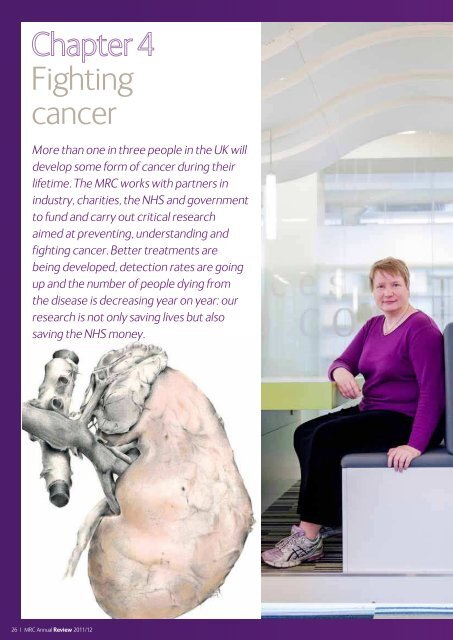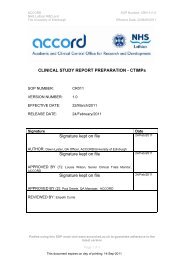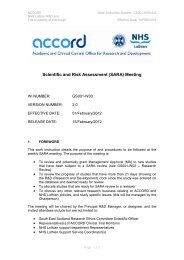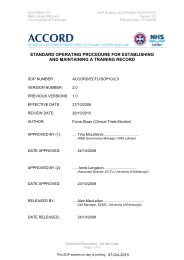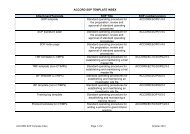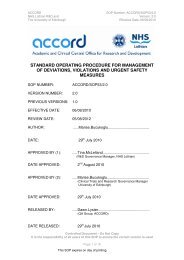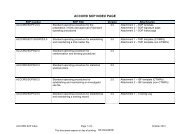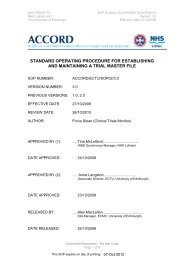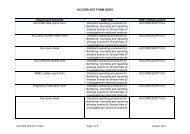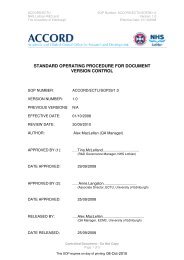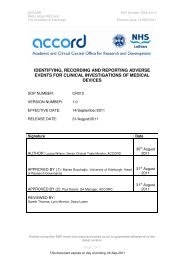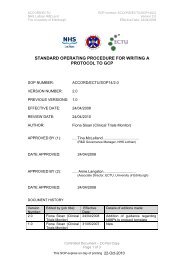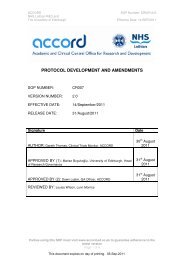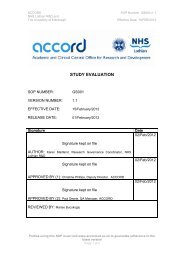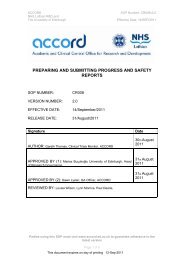Advancing medicine, changing lives - Medical Research Council
Advancing medicine, changing lives - Medical Research Council
Advancing medicine, changing lives - Medical Research Council
Create successful ePaper yourself
Turn your PDF publications into a flip-book with our unique Google optimized e-Paper software.
PROFILE: Professor Wiebke Arlt, University of Birmingham<br />
Fighting<br />
cancer<br />
More than one in three people in the UK will<br />
develop some form of cancer during their<br />
lifetime. The MRC works with partners in<br />
industry, charities, the NHS and government<br />
to fund and carry out critical research<br />
aimed at preventing, understanding and<br />
fighting cancer. Better treatments are<br />
being developed, detection rates are going<br />
up and the number of people dying from<br />
the disease is decreasing year on year: our<br />
research is not only saving <strong>lives</strong> but also<br />
saving the NHS money.<br />
Cancer of the adrenal glands is hard to detect because the<br />
glands are hidden deep inside the body and the disease can<br />
be symptomless in its early stages – so new diagnostic tests<br />
are urgently needed. In 2011, with MRC funding, Professor<br />
Wiebke Arlt developed the first urine test for adrenal cancer<br />
which could replace expensive CT scans and avoid the need<br />
for surgery in suspected cases that turn out to be benign.<br />
Wiebke is fascinated by hormones – in fact she’s built her<br />
career around studying them. Early on in her career, as a<br />
young doctor in Germany, she was the first to establish<br />
that male hormones (androgens) affect libido and feelings<br />
of wellbeing in women. During a trial to restore these<br />
hormones in women with androgen deficiency she began<br />
to receive thank-you gifts of flowers and wine from their<br />
husbands, which she says “was an early sign of what was<br />
going on”.<br />
She’s been hooked on endocrinology (hormone research)<br />
ever since and today she is head of the Centre for<br />
Endocrinology, Diabetes and Metabolism at the University<br />
of Birmingham. One of her particular interests is a group of<br />
hormones called steroids, which are made by the adrenal<br />
glands that sit just above our kidneys.<br />
It was while studying rare conditions caused by underor<br />
over-production of steroid hormones that Wiebke<br />
came up with the idea of using a technique called gas<br />
chromatography/mass spectrometry (GC/MS) to measure<br />
the individual steroid hormones in the body.<br />
With MRC funding, Wiebke and her colleagues carried out a<br />
trial of 45 patients who were known to have adrenal cancer<br />
that had spread and compared them with 100 patients who<br />
had adrenal tumours that turned out to be benign nodules.<br />
“We ran GC/MS tests on their urine collected over 24<br />
hours and analysed the results. This revealed that there is a<br />
specific ‘steroid fingerprint’ for adrenal cancer in the urine<br />
of some of the molecules that go on to become a steroid<br />
hormone, and these so-called precursors are not detectable<br />
in the blood. This work, funded with a biomarker grant from<br />
the MRC, has shown that the test detects the malignancy<br />
with 90 per cent sensitivity and specificity.”<br />
This discovery will have a huge impact for patients and<br />
for the NHS because it offers the possibility of replacing<br />
expensive scans with a quick, simple urine test. A big<br />
research study is about to start to see whether the test can<br />
be transferred to a faster type of technology called high<br />
throughput LC/MS, which could rapidly analyse urine for up<br />
to 10 steroids in less than five minutes.<br />
“In theory, the patient could just bring the urine to the clinic<br />
and in the afternoon we would already know whether the<br />
fingerprint for malignancy is in their urine or not,” explains<br />
Wiebke. “This would also avoid the need for expensive topto-toe<br />
CT scans to check for cancer recurrence in patients<br />
who’ve had an adrenal cancer removed, as the urine test<br />
may prove to be more sensitive than imaging. Our team are<br />
currently studying whether this is the case.”<br />
Wiebke realised that this technique might also be useful for<br />
diagnosing cancer of the adrenal glands, because she had<br />
a hunch that adrenal cancer cells might lose the ability to<br />
produce normal levels of steroid hormones. She wanted<br />
to see if it was possible to distinguish adrenal cancer<br />
patients from healthy people by measuring the products of<br />
hormones broken down by the body and excreted in urine.<br />
“In the UK a lot of imaging is done for people who<br />
complain of non-specific tummy pain, and during these<br />
procedures we often discover nodules on the adrenal<br />
glands. In a small number of cases a nodule can turn out to<br />
be cancer and needs to be taken out. But diagnosis takes<br />
multiple tests and CT scans, and that can mean huge costs,”<br />
explains Wiebke.<br />
“Also, up to 60 per cent of surgical removals of large<br />
adrenal nodules end up revealing that the nodule is benign.<br />
So in the vast majority of these cases, a urine test would<br />
completely avoid the need for expensive surgery and the<br />
associated risks to the patient,” she adds.<br />
Together with diagnostics company Bioscience Ventures,<br />
Wiebke and her team are carrying out a prospective study<br />
of the test and hope to launch it as a diagnostic product<br />
in 2013.<br />
“The MRC biomarker grant funding was critical to the<br />
translation of my ideas to clinical application because it<br />
funded a biochemist, a mass spectrometrist who did the<br />
analysis and a computer science postdoctoral researcher<br />
who did the computational analysis. So it was absolutely<br />
key to the development of the test,” says Wiebke.<br />
“For me, the highlight of my work is to combine clinical<br />
practice with discovery research and translational research<br />
that has lab aspects and clinical aspects to it. It’s incredibly<br />
satisfying because you can see something through from the<br />
start to the finish, such as with the adrenal tumour test, and<br />
hopefully end up helping more patients than you could ever<br />
hope to treat in your career.”<br />
26 | MRC Annual Review 2011/12 MRC Annual Review 2011/12 | 27


